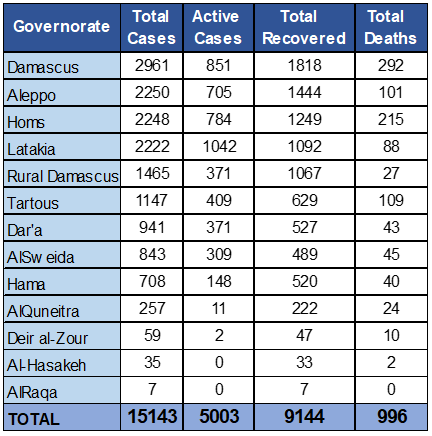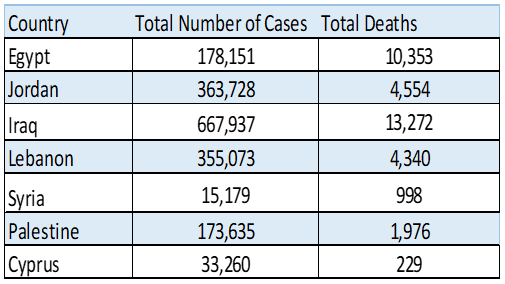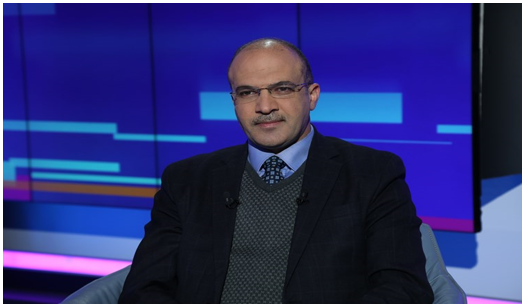MECC Coronavirus (COVID 19) Weekly Report
SYRIA: COVID-19
Humanitarian Update No. 48
Reporting period: from 15 to 21 February 2021
Coronavirus cases: 15143 Active cases: 5003 Recovered: 9144 Deaths: 996 [1]
Highlights
In GoS-controlled areas of the country,(as of 20 Feb), the Syrian Ministry of Health (MoH) reported 15143 Laboratory-confirmed cases, 996 fatalities, and 9144 Recoveries.
15143 laboratory-confirmed cases have been reported by the Syrian MoH : 2961 in Damascus; 2250 in Aleppo; 2248 in Homs; 2222 in Lattakia; 1465 in Rural Damascus; 1147 in Tartous; 941 in Dar’a; 843 in Sweida; 708 in Hama; 257 in Quneitra; 59 in Deir-Ez-Zor; 35 in Al-Hasakeh and 7 in Ar-Raqqa.
In NES, as of 16 February, there have been 8,537confirmed cases of COVID-19. Of these, 6,022are currently recorded as active, 2,095 have recovered, and 419 deaths (264 among lab-confirmed cases).
In NWS, as of16 February, a total of 21,072confirmed cases of COVID-19 have been reported. The total number of COVID-19 associated deaths is 407. Of confirmed cases, 2,210 living in camps (10.5 per cent of the total). Out of the total number of cases,17,000 have recovered, and 3,416are active cases. Just over eight per cent (1,548) of the total number of cases have been health care workers.
Preparedness and response
During the reporting period, more than 8,985 suspected COVID-19 cases were investigated properly within 24 hours; in addition, WHO supported the transport of 4,146 specimens of suspected cases to the central laboratories.
WHO supported workshops on COVID-19 surveillance, with 175 health workers out of the 400 planned trained to date on COVID-19 investigation and response for cases reported at schools.
WHO supported three training workshops on enhancing PoE capacity, focused on enhancing PoE preparedness and response capacity,specifically IPC measures and risk communication. A total of 75 people from 14 governorates participated.
In the reporting period, WHO supported molecular biology, SARS-CoV-2 diagnosis training for laboratory technicians in Aleppo, Lattakia, Homs and Rural Damascus.
WHO conducted a needs assessment at isolation hospitals in Tartous, focusingon IPC/PPE measures. Training in IPC and the use of PPE also continued. In the reporting period, WHO supported training for 125 health care workers in Hama, Rural Damascus, Lattakia, Quneitra and Dar’a on IPC/PPE.
In NWS, Infection Prevention and Control (IPC) specialized training was delivered to 8 COVID-19 Community treatment centres (CCTC) covering 312 medical and non-medical staff. Currently, WHO is looking to extending its support to the IPC project for a further six months.
In the reporting period, WHO supported training for 125 health workers including immediate life support and ventilator management in Damascus and Homsand60 health workers on the newly established emergency isolation centre in Damascus on case management.
WHO provided several isolation hospitals with lifesaving medicines, anaesthesia medicines and medical equipment, including two portable ventilators.
In NWS, During this reporting period, a total of 3,167were admitted to CCTC. WHO is currently looking to extend its support to Al-Sham Dana COVID-19 designated hospital to the 25 July.
The Logistics Cluster facilitated the transportation of 3MT of Health Sector cargo by air from Damascus to Qamishli. This is in addition to a UNHAS service for air passengers between Damascus and Qamishli. During the reporting period, the UNHAS service expanded to include twice-weekly flights to Aleppo.
During the reporting period, more than 8,985 suspected COVID-19 cases were investigated properly within 24 hours; in addition, WHO supported the transport of 4,146 specimens of suspected cases to the central laboratories.
WHO supported workshops on COVID-19 surveillance, with 175 health workers out of the 400 planned trained to date on COVID-19 investigation and response for cases reported at schools.
Vaccines
Syria is one of the 92 countries eligible for Advanced Market Distribution (AMD) of COVID-19 vaccines under the COVAX facility, a partnership between the World Health Organization (WHO), the Coalition for Epidemic Preparedness Innovations (CEPI), and the Global Alliance for Vaccines and Immunization (GAVI).[2]
In coordination with UNICEF, WHO continues its engagement with the MoH concerning technical assistance for the documentation needed for the COVID-19 Vaccine application process under COVID-19 Vaccines Global Access Facility (COVAX).
Part A of the application was signed by the MoH and submitted to GAVI on 15 December 2020. Part B (legal) of the COVAX application is still under consideration.
As of January, all the necessary coordination committees (National Coordination Committee –NCC;COVID-19 Technical Advisory Group –cTAG; and the Inter-Agency Coordination Committee-ICC) and adjusted TORs have been approved, with ten technical sub-committees formed with WHO and UNICEF representation.
Ongoing essential work includes WHO support for a National Readiness Assessment tool, endorsed by the MoH on 20 January. This includes a set of 50 key operational activities.
Additionally, work is ongoing to support other planning necessary for vaccine rollout, including developing IPC and waste management protocols, national cold chain inventory, and planning to target hard-to-reach areas, including camps and settlements.
At present, the national authorities collect and consolidate population data (including from the Ministry of Planning, Central Statistics Office, Syndicate of Doctors and Health Workers at national and governate levels).
Per the COVAX Interim Distribution Forecast, Syria could receive up to 1.02 M vaccine doses in Q 1and Q 2.
In NES, As per the prioritization criteria established under the Syria National Deployment and Vaccination Plan (NDVP). WHO will lead the initial vaccination rollout in NES, building on the network of public health facilities and mobile teams which have been utilized to support Expanded Programme on Immunization (EPI)
In NWS, planning is underway for COVID-19 vaccinations, with preliminary discussions focused on vaccinating some 20 percent of the northwest Syria population through COVAX. The WHO Gaziantep office, together with UNICEF, has submitted COVAX applications relying, for the implementation, on the currently existing immunization programme modalities in northwest Syria.[3]
Lebanon: COVID-19
Humanitarian Update No. 45
Reporting period: from 16 to 22 February 2021
Coronavirus cases: 355,073 Deaths: 4,340 Recovered: 268,071
Highlights
Recent corona-related figures from the WHO.
Dr. Hamad Hassan: Since there is no other alternative, the vaccine is the only solution.
During this reporting period, the average number of cases per day dropped to 2,366.
The Minister of Industry in the caretaker government, Imad Hoballah, the Russian ambassador, Alexander Rudakov, visited the factory of "Arawan" for pharmaceutical industries in the town of Jadra on the Chouf coast, in Iqlim al-Kharroub region, to discuss the possibility of producing the Russian vaccine in Lebanon.
The Ministry of Public Health began supervising the implementation of the national vaccination campaign in the various centers that have been identified through its medical teams deployed in all Lebanese regions, based on the national plan for vaccination prepared by the Ministry and approved by the Lebanese government.
According to the Minister of Public Health, Dr. Hamad Hassan, 650, 000 Lebanese have already registered to attain the vaccine.
The Minister of Public Health announced that Lebanon needs two million additional doses of the anti-Coronavirus vaccine in addition to those that were secured under previous agreements (six million doses: two million and one hundred thousand from Pfizer, two million and 750 thousand via Kovacs, one and a half million from AstraZeneca still in operation).
The Minister of Public Health discussed with the Russian ambassador the issue of bringing the Russian vaccine "Sputnik", in light of the decision of the Russian Investment Fund to complete cooperation in this field directly through the Ministry of Public Health, while encouraging the participation of private and sectoral initiatives from unions and institutions.
The Minister of Public Health launched two vaccination campaigns at Tibnin Governmental Hospital and Bint Jbeil Governmental Hospital, which had received from the Ministry of Public Health 180 doses. They will be given to the medical and nursing staff and some names registered on the online platform according to the order of registration and attendance.
The General Directorate of General Security reported several gatherings/ demonstrations due to the worsening socioeconomic conditions and the removal of prosecutor Fady Sawan.
[1] Microsoft power MOH,20 Feb 2021
[3] SYRIAN ARAB REPUBLICCOVID-19 Response Update No.15 As of 16 February2021
Communication and Public Relations Department




